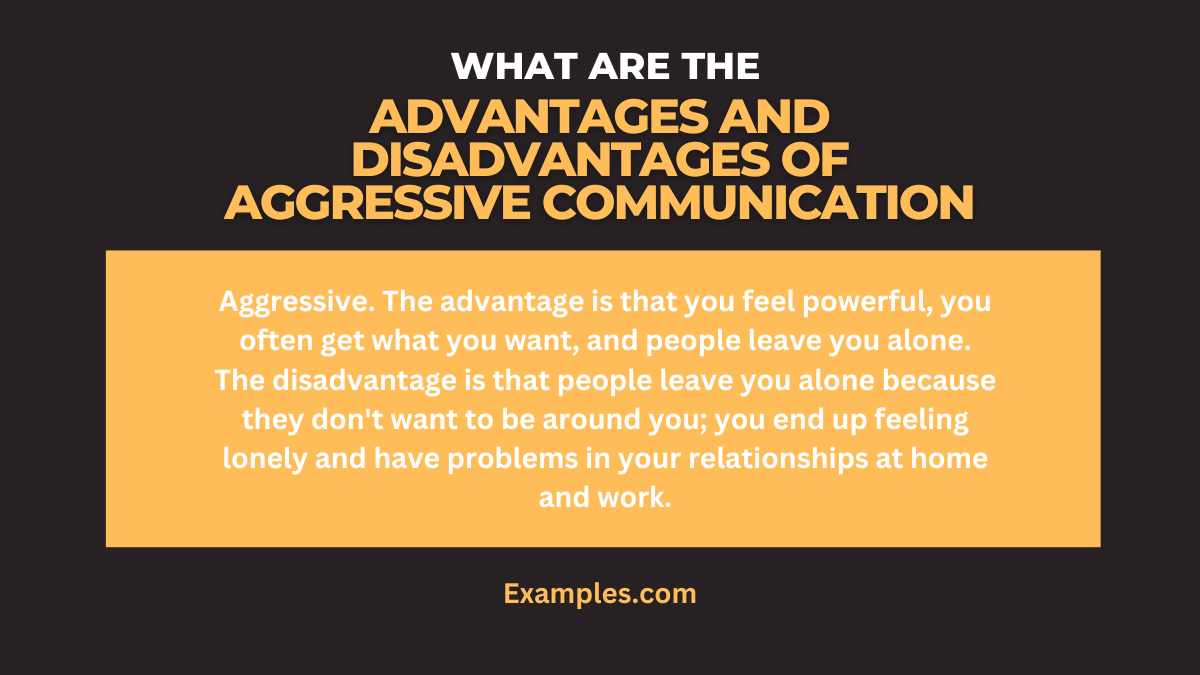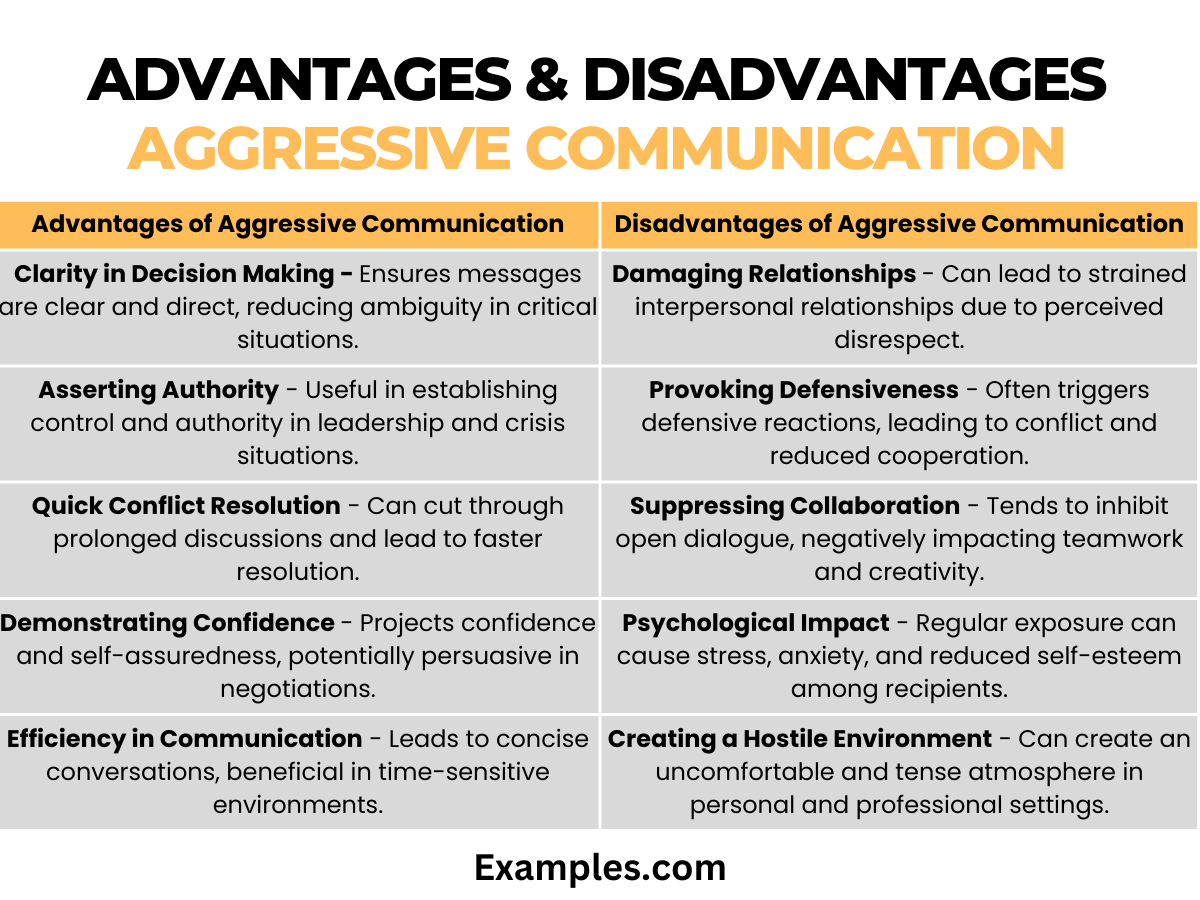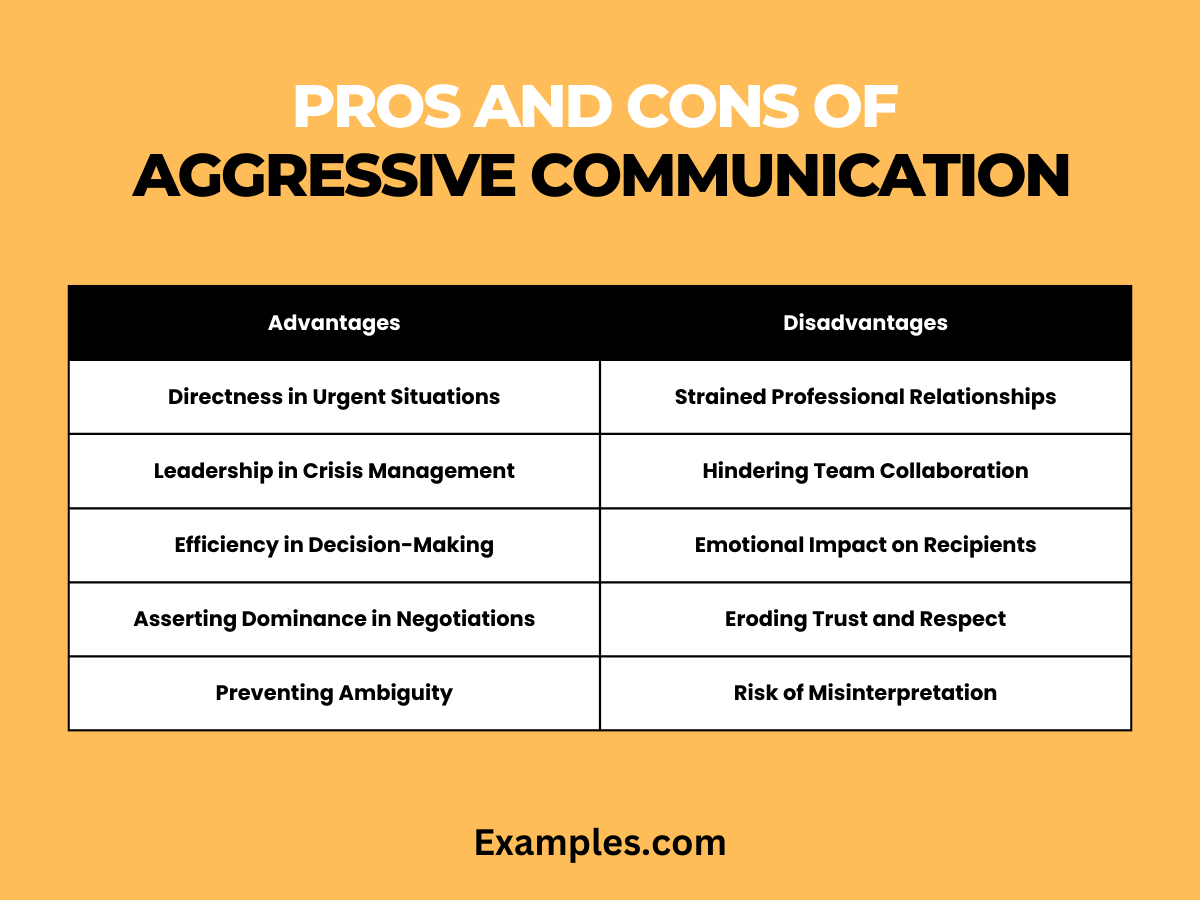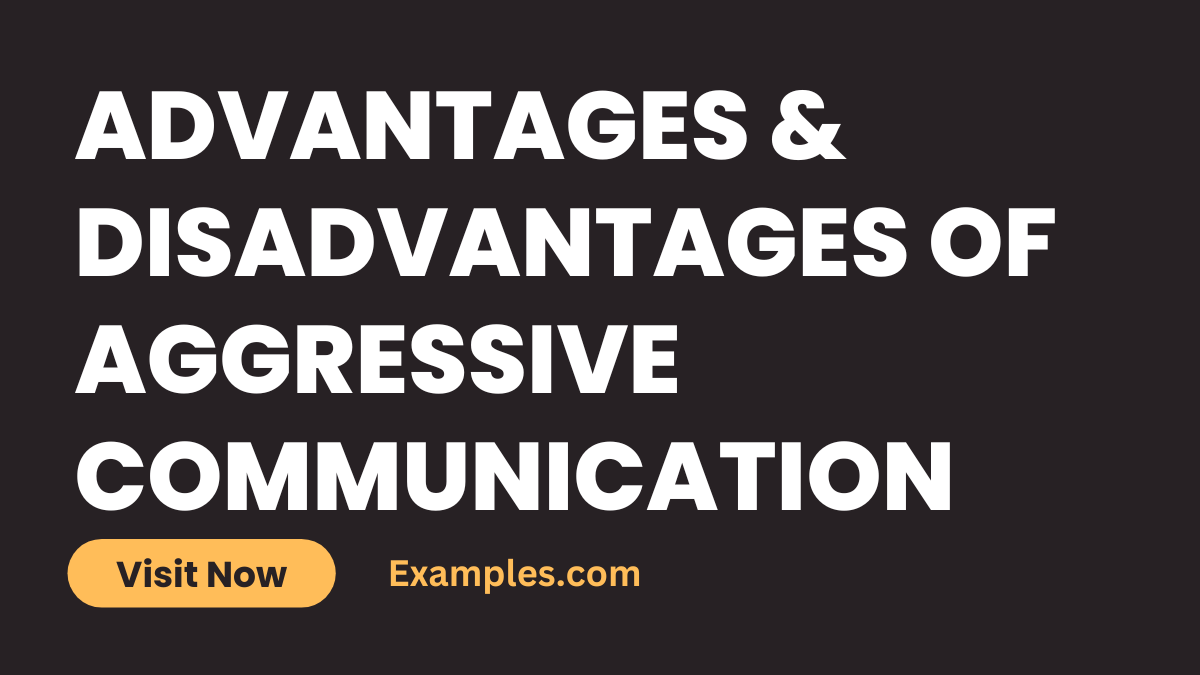Advantages & Disadvantages of Aggressive Communication Examples
What are the Advantages and Disadvantages of Aggressive Communication?

Aggressive communication is a style where individuals express themselves in a forceful and often confrontational manner. While it can be perceived negatively, this style also has certain advantages. One of the key advantages is the ability to communicate decisively and directly, which can be effective in situations requiring clear leadership or in emergencies. However, the disadvantages are significant. Aggressive communication can lead to conflicts, damaged relationships, and a negative atmosphere, particularly in settings like the workplace or in personal interactions. This style, characterized by verbal attacks in aggressive communication and intimidation tactics, often hinders collaboration and mutual respect. Balancing this style with more empathetic and understanding communication methods is crucial to maintaining healthy interactions.
Advantages and Disadvantages of Aggressive Communication

Aggressive communication, often characterized by directness and assertiveness, holds both benefits and drawbacks in various communication contexts. Understanding these can greatly impact how individuals interact in personal, professional, or leadership scenarios. This section uncovers 10 unique advantages and disadvantages of aggressive communication, each explained with context and implications. From its effectiveness in certain decision-making situations to the potential for conflict and relationship strains, these insights offer a comprehensive view of this communication style’s impact.
| Advantages of Aggressive Communication | Disadvantages of Aggressive Communication |
|---|---|
| Clarity in Decision Making – Ensures messages are clear and direct, reducing ambiguity in critical situations. | Damaging Relationships – Can lead to strained interpersonal relationships due to perceived disrespect. |
| Asserting Authority – Useful in establishing control and authority in leadership and crisis situations. | Provoking Defensiveness – Often triggers defensive reactions, leading to conflict and reduced cooperation. |
| Quick Conflict Resolution – Can cut through prolonged discussions and lead to faster resolution. | Suppressing Collaboration – Tends to inhibit open dialogue, negatively impacting teamwork and creativity. |
| Demonstrating Confidence – Projects confidence and self-assuredness, potentially persuasive in negotiations. | Psychological Impact – Regular exposure can cause stress, anxiety, and reduced self-esteem among recipients. |
| Efficiency in Communication – Leads to concise conversations, beneficial in time-sensitive environments. | Creating a Hostile Environment – Can create an uncomfortable and tense atmosphere in personal and professional settings. |
Advantages of Aggressive Communication
- Clarity in Decision Making: Aggressive communication provides clear, unambiguous messages. In leadership or crisis situations, this directness helps in making quick decisions, eliminating confusion.
- Asserting Authority: In managerial or leadership roles, aggressive communication can establish authority and control, ensuring that directives are followed and objectives are met promptly.
- Quick Conflict Resolution: When used appropriately, aggressive communication can cut through prolonged discussions and lead to quicker conflict resolution, though it may not always be the most diplomatic approach.
- Demonstrating Confidence: This style can project confidence and self-assuredness, which can be persuasive in negotiations or competitive business scenarios.
- Efficiency in Communication: Aggressive communication often leads to concise and to-the-point conversations, which can be more efficient in time-sensitive environments.
Disadvantages of Aggressive Communication
- Damaging Relationships: Aggressive communication can lead to strained relationships, both in personal and professional settings, as it can be perceived as disrespectful or intimidating.
- Provoking Defensiveness: This style can provoke defensive reactions from others, leading to conflict escalation instead of constructive dialogue.
- Suppressing Collaboration: In team environments, aggressive communication can suppress open dialogue and collaboration, leading to a decrease in team morale and creativity.
- Psychological Impact: Regular exposure to aggressive communication can lead to stress, anxiety, and reduced self-esteem among recipients.
- Creating a Hostile Environment: In workplaces or personal relationships, this communication style can create an uncomfortable and hostile environment, affecting overall well-being and productivity.
Pros and Cons of Aggressive Communication

Aggressive communication, known for its direct and forceful nature, can be a potent tool in certain contexts but also poses significant risks. This section explores the pros and cons of this communication style, featuring 10 distinct points with detailed explanations. Understanding these aspects is crucial, especially when considering aggressive communication in the workplace or in personal relationships. From its effectiveness in decision-making to the potential for creating a hostile environment, this analysis provides a comprehensive view, enriched with aggressive communication examples and insights into aggressive communication styles.
| Pros of Aggressive Communication | Cons of Aggressive Communication |
|---|---|
| Directness in Urgent Situations – Beneficial for conveying messages quickly and taking immediate action in critical scenarios. | Strained Professional Relationships – Can lead to a tense atmosphere, affecting workplace harmony and collaboration. |
| Leadership in Crisis Management – Assertiveness can be effective for decisive leadership and clear instructions during crises. | Hindering Team Collaboration – Intimidating communication style can inhibit teamwork and diminish collaborative efforts. |
| Efficiency in Decision-Making – Facilitates fast decision-making, cutting through hesitation and driving quick actions. | Emotional Impact on Recipients – Regular exposure can negatively affect the emotional well-being of individuals, leading to stress and reduced morale. |
| Asserting Dominance in Negotiations – Can be useful in competitive situations like negotiations, where strong positioning is required. | Eroding Trust and Respect – Aggressive communication can damage personal and professional relationships, eroding trust and respect. |
| Preventing Ambiguity – Provides clarity in communication, especially valuable in high-stakes or emergency situations. | Risk of Misinterpretation – Often leads to conflicts and misunderstandings due to its confrontational nature. |
Pros of Aggressive Communication
- Directness in Urgent Situations: In urgent or critical situations, the directness of aggressive communication can be beneficial, ensuring that messages are conveyed quickly and actions are taken promptly.
- Leadership in Crisis Management: Its assertiveness can be effective in crisis management, where decisive leadership and clear instructions are paramount for quick resolution.
- Efficiency in Decision-Making: Aggressive communication often leads to fast decision-making, as it cuts through hesitation and drives action, a trait valuable in high-stakes business decisions.
- Asserting Dominance in Negotiations: In competitive environments like negotiations, it can help in asserting dominance and persuading others, though this should be balanced with tact.
- Preventing Ambiguity: This style prevents ambiguity, providing clarity in communication, especially in aggressive communication in nursing or emergency services.
Cons of Aggressive Communication
- Strained Professional Relationships: Aggressive communication can strain professional relationships, leading to a tense atmosphere in settings like aggressive communication in the workplace.
- Hindering Team Collaboration: It can hinder teamwork and collaboration, as team members may feel intimidated or undervalued, leading to decreased productivity.
- Emotional Impact on Recipients: Regular exposure to aggressive communication can have a negative emotional impact, leading to stress and reduced morale among team members.
- Eroding Trust and Respect: This communication style can erode trust and respect, especially in aggressive communication in relationships, affecting both personal and professional bonds.
- Risk of Misinterpretation: Aggressive sentences can often be misinterpreted, leading to conflicts and misunderstandings, contrary to the goals of effective communication.
In conclusion, this guide on aggressive communication offers a deep dive into its nuanced pros and cons. While it can be effective in certain scenarios, the potential drawbacks, especially in terms of relationships and workplace dynamics, are significant. Understanding these aspects helps in choosing communication styles wisely, fostering healthier, more productive interactions in both personal and professional settings.



